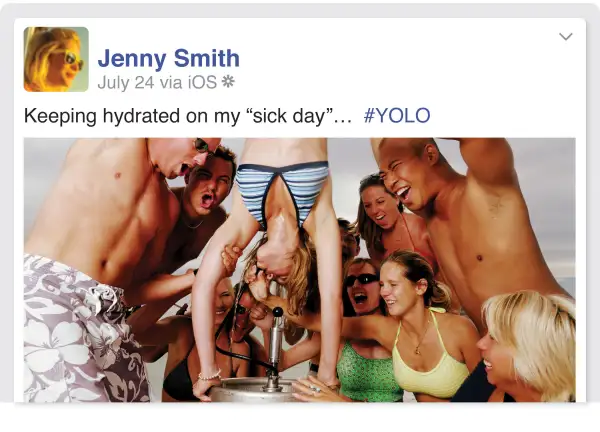10 Social Media Blunders That Cost a Millennial a Job — or Worse

As managers grow savvier (and Facebook privacy settings grow meaningless) it is increasingly foolish to assume that those years-old photos of you double-fisting shots won't come back to haunt you—and maybe even wreak havoc on your career. A whopping 93% of recruiters check out social media profiles of prospective hires.
"Social media is now so woven into the fabric of young people's lives that they forget not everything is suitable to put out there," says former hiring manager Alison Green, who runs askamanager.org. "People are looking."
So remember your boss, work colleagues, and hiring managers can see your most polarizing tweets, even if they aren't following you. And even if your public Facebook profile looks like Fort Knox, anyone can see images you're tagged in by using graph search. Typing "photos of person's name" into the search window reveals hidden pictures. Test it out to see how creepy it is.
Also note that a social media mistake can ruin your shot at a job without you ever knowing. Green, for example, never told a certain oversharing applicant (let's call him the "masturblogger": see #2 below) about why he wasn't hired for a job at her nonprofit. "To people who don't lock down their accounts because 'it's never been a problem,' I say, you don't know whether that's true," she says.
If you're not at least a little worried yet, here are 10 real-life mistakes, ranked from least to most egregious, that could cost you your next job—or worse, make you the next viral cautionary tale.
10. Drinking in a photo—even if you're over 21. Yes, seriously. A teacher in Georgia was asked to resign because of a Facebook photo of her holding wine and a beer.
9. Complaining about your job. A British teen was let go from a marketing gig after colleagues saw a Facebook post in which she described her job shredding paper as "dull," even though she didn't mention the name of the company.
8. Posting while you're supposed to be working. A city clerk in California's Bay area was asked to resign this year for allegedly tweeting during council meetings when she was supposed to be taking down meeting minutes. In her resignation letter, she described the job as a "mind-numbingly inane experience I would not wish on anyone."
7. Making fun of your boss / team. An EMS employee was booted for badmouthing her boss on Facebook (though she ended up with the National Labor Relations Board on her side), and a Pittsburgh Pirates mascot, whose work included racing on the field in a pierogi costume, was briefly fired for a post criticizing the contract extensions of two players—though he was back in his costume a week later.
6. Making fun of clients or donors. While working at a nonprofit, Green nearly fired an employee after the young woman snarkily tweeted a photo of a donation card on which a donor had written eccentric comments. Not only was it in bad taste, says Green, but it revealed the donor's name. After deleting the tweet (and getting an earful about judgment and boundaries), the woman kept her job.
5. Talking smack about a job before you've even accepted it. Technically, the then-22-year-old in question says she had already turned down an internship at Cisco before sending out a tweet saying she'd have to weigh a "fatty paycheck" against "hating the work," but her subsequent infamy serves as a lesson to other prospective hires.
4. Blowing your own cover. A bank intern who asked to skip work because "something came up at home" became a victim of internet shaming after his boss saw a Facebook photo of him holding a beer, dressed (more or less) like Tinkerbell at what appeared to be a Halloween party. The photo, plus screenshots of his supervisor's response— "hope everything is ok in New York. (cool wand)" —went viral, though it turns out he was never actually fired.
3. Revealing company secrets. Back in 2011, it was widely reported that an extra on Fox's award-winning show "Glee" was fired after tweeting spoilers for an upcoming episode. In tweets that are still visible on his feed, a series co-creator told her, "Hope you're qualified to do something besides work in entertainment" and "Who are you to spoil something talented people have spent months to create?" But according to the extra herself, Nicole Crowther, she hadn't actually worked on the show that season and the spoilers were just speculation—not inside information. That didn't stop her story from going viral, complete with online harassment: "I received physical threats of violence, and death threats through social media," Crowther told Money.
2. Sexual oversharing. Green once interviewed a young man whose resume included a link to a private blog—which described personal details about chronic masturbation. "I suspect he'd left that link on there by accident, but it demonstrated very poor judgment," says Green. Needless to say, he did not get the job.
1. Posting something embarrassing on the corporate Twitter feed. A contracted social media strategist was canned after accidentally posting a tweet on Chrysler's company feed, instead of his personal feed, insulting local drivers: "I find it ironic that Detroit is known as the #motorcity and yet no one here knows how to f****** drive." Given the circumstances, Chrysler's response was surprisingly sanguine.
